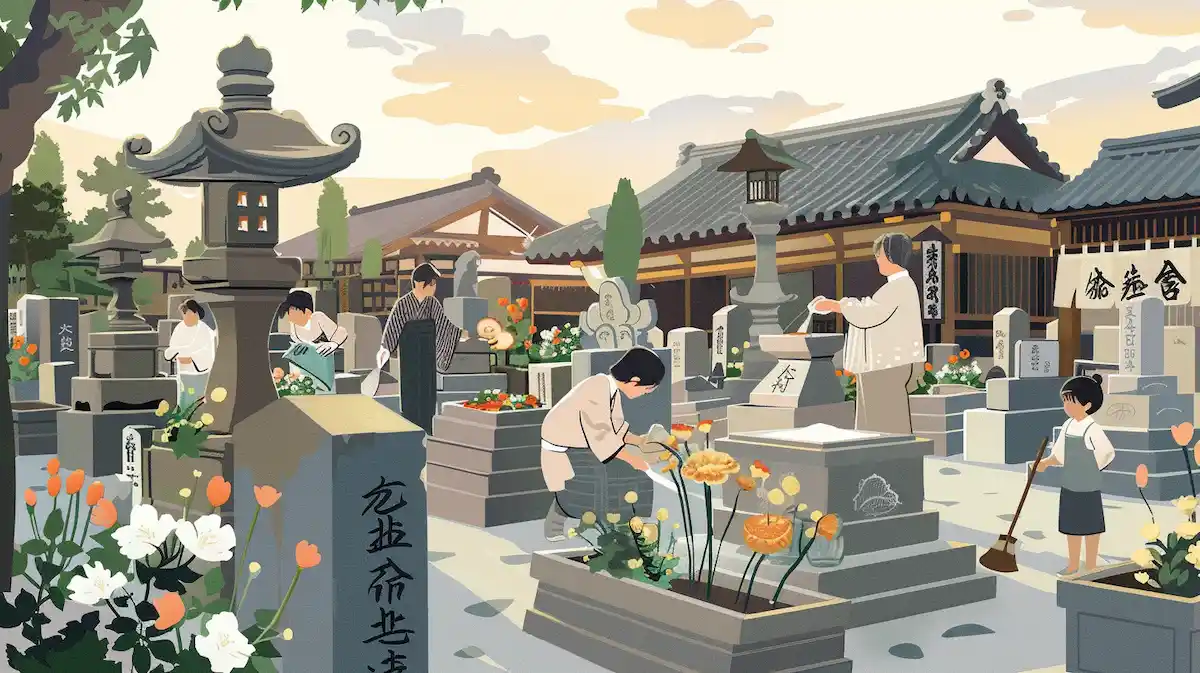お盆を英語で説明・紹介するための基本情報と、英会話に役立つ表現をシンプルでわかりやすい英語で紹介します。
英会話ダイアローグ・関連情報・10の質問を通して、お盆に関する英語表現を学びます。
英語
英会話ダイアローグを読む前に知っておくと良い前提知識と情報は以下の通りです。
- お盆の期間:
- 通常8月13日から16日に行われる
- 一部の地域では7月に行われる
- お盆の目的:
- 先祖の霊を迎え、供養するための行事
- 家族が集まり、先祖に感謝と敬意を表す
- 迎え火と送り火:
- お盆の初日(8月13日)に迎え火を焚いて霊を家に迎え入れる
- 最終日(8月16日)に送り火を焚いて霊を送り出す
- 盆棚:
- 家の祭壇で果物やお菓子、花などの供物を捧げる
- 霊がこの祭壇に宿ると考えられている
- 盆踊り:
- お盆期間中に行われる伝統的な踊り、先祖の霊を楽しませ、敬意を示す
- 墓参り:
- 家族で墓を訪れ、掃除し、花や食べ物を供え、先祖への感謝と敬意を示す
2人がお盆について話しています。
お盆の期間や目的、起源、迎え火や送り火、供物や盆棚、盆踊り、お墓参りといった習慣などを話題にしています。
会話 / dialogue

Hey Key, Obon is coming up soon. Do you have any plans?

Yes, I’m going back to my hometown to celebrate with my family. What about you, Mack?

I’m staying in Tokyo, but I’m really interested in learning more about Obon. Can you tell me about it?

Sure! Obon is a time to honor and remember our ancestors. It usually takes place from August 13th to 16th, but some places celebrate it in July.

Interesting. What are the main activities during Obon?

We start by lighting “Mukaebi” fires on the first day to guide the spirits of our ancestors back home. We also set up a Bon altar with offerings like fruits, vegetables, sweets, and cooked rice.

What do you do with the Bon altar?

The spirits are believed to stay at the altar during Obon. We place food and drinks there to welcome and honor them. We also burn incense to purify the space.

I heard about Bon Odori. What is that?

Bon Odori is a traditional dance performed to entertain and honor the spirits. It brings the community together and is a lot of fun. Each region has its own style of dance.

That sounds amazing. What happens at the end of Obon?

On the last day, August 16th, we light “Okuribi” fires to guide the spirits back to the spirit world. It’s also common to visit the graves of our ancestors again to say goodbye and offer thanks.

How did Obon start?

The origin of Obon comes from a Buddhist event called Ullambana. One of Buddha’s disciples, Mokuren, saved his mother’s spirit by offering food to monks. This story became a tradition in Japan.

What kind of offerings do you usually make?

We offer seasonal fruits, vegetables, sweets, rice, and tea. Fresh flowers are also placed on the altar and graves.

Do you clean the graves during Obon?

Yes, we visit the graves to clean them and make offerings. It’s a way to show respect and gratitude to our ancestors.

What else do you do with your family during Obon?

We spend time together, share stories about our ancestors, and enjoy traditional foods. It’s a time for family bonding and remembering our roots.

This sounds like a meaningful tradition. I’d love to experience it someday.

You should! It’s a beautiful way to connect with the past and appreciate our cultural heritage.

Thanks for explaining, Key. I feel like I understand Obon much better now.

You’re welcome, Mack. Enjoy the Obon season!
関連情報 / related information
「お盆」について、理解を深めるための「英語での関連情報」です。
お盆

What is Obon?
Obon is a traditional Japanese event to honor and remember the spirits of ancestors. It usually takes place from August 13th to 16th, but some areas celebrate it in July. During Obon, it is believed that the spirits of ancestors return to the world of the living.
Main Customs
Families light small fires called “Mukaebi” on the first day to guide the spirits home. They set up a special altar called a Bon altar with offerings like fruits, vegetables, sweets, and cooked rice. These offerings are meant to welcome and honor the spirits.
Bon Odori
Bon Odori is a traditional dance performed during Obon. It is done to entertain and honor the spirits. People from the community come together to dance and enjoy the festival. Each region in Japan has its own style of Bon Odori.
Visiting Graves
Another important custom during Obon is visiting the graves of ancestors. Families clean the graves and make offerings of flowers, food, and incense. This shows respect and gratitude to their ancestors.
Ending Obon
On the last day of Obon, families light “Okuribi” fires to send the spirits back to the spirit world. This helps the spirits find their way back. Obon is a special time for family bonding and remembering ancestors, making it an important cultural tradition in Japan.
10の質問 / 10 questions
「お盆」について、理解を深めるための「英語での10の質問」です。
1: What is Obon?
Obon is a traditional Japanese event to honor and remember the spirits of ancestors. It usually takes place from August 13th to 16th.
2: When is Obon celebrated?
Obon is typically celebrated from August 13th to 16th, but some regions in Japan celebrate it in July.
3: What do people do on the first day of Obon?
On the first day of Obon, families light small fires called "Mukaebi" to guide the spirits of their ancestors back home.
4: What is a Bon altar?
A Bon altar is a special altar set up during Obon with offerings like fruits, vegetables, sweets, and cooked rice to welcome and honor the spirits of ancestors.
5: What is Bon Odori?
Bon Odori is a traditional dance performed during Obon to entertain and honor the spirits of ancestors. It is a community activity that varies by region.
6: Why do families visit graves during Obon?
Families visit graves during Obon to clean them, make offerings, and show respect and gratitude to their ancestors.
7: What offerings are placed on the Bon altar?
Offerings on the Bon altar typically include seasonal fruits, vegetables, sweets, cooked rice, tea, and fresh flowers.
8: What is the purpose of "Okuribi" fires?
"Okuribi" fires are lit on the last day of Obon to guide the spirits of ancestors back to the spirit world.
9: How did Obon originate?
Obon originated from a Buddhist event called Ullambana, where a disciple of Buddha saved his mother's spirit by offering food to monks, which became a tradition in Japan.
10: What is the significance of Bon Odori?
The significance of Bon Odori is to bring the community together, celebrate, and show respect to the spirits of ancestors through dance and music.
和訳付
会話 / dialogue

Hey Key, Obon is coming up soon. Do you have any plans?
ねえ、キー。もうすぐお盆だね。何か予定はある?

Yes, I’m going back to my hometown to celebrate with my family. What about you, Mack?
うん、家族と一緒にお祝いするために実家に帰るつもりだよ。マックはどう?

I’m staying in Tokyo, but I’m really interested in learning more about Obon. Can you tell me about it?
僕は東京にいるけど、お盆についてもっと知りたいんだ。教えてくれる?

Sure! Obon is a time to honor and remember our ancestors. It usually takes place from August 13th to 16th, but some places celebrate it in July.
もちろん!お盆は先祖を敬い、思い出すための時間だよ。通常は8月13日から16日にかけて行われるけど、一部の地域では7月に行われるんだ。

Interesting. What are the main activities during Obon?
興味深いね。お盆の主な活動は何?

We start by lighting “Mukaebi” fires on the first day to guide the spirits of our ancestors back home. We also set up a Bon altar with offerings like fruits, vegetables, sweets, and cooked rice.
初日には「迎え火」を焚いて先祖の霊を家に導くんだ。それから果物、野菜、お菓子、炊いたご飯などを供えた盆棚を作るよ。

What do you do with the Bon altar?
盆棚では何をするの?

The spirits are believed to stay at the altar during Obon. We place food and drinks there to welcome and honor them. We also burn incense to purify the space.
お盆の間、先祖の霊は盆棚にいると信じられているんだ。そこで食べ物や飲み物を供えて迎え入れ、敬意を表すんだ。お香も焚いて空間を清めるよ。

I heard about Bon Odori. What is that?
盆踊りについて聞いたことがあるけど、それは何?

Bon Odori is a traditional dance performed to entertain and honor the spirits. It brings the community together and is a lot of fun. Each region has its own style of dance.
盆踊りは霊を楽しませ、敬うための伝統的な踊りだよ。コミュニティを一つにし、とても楽しいんだ。地域ごとに独自の踊りのスタイルがあるよ。

That sounds amazing. What happens at the end of Obon?
すごく楽しそうだね。お盆の終わりには何が起こるの?

On the last day, August 16th, we light “Okuribi” fires to guide the spirits back to the spirit world. It’s also common to visit the graves of our ancestors again to say goodbye and offer thanks.
最終日の8月16日には「送り火」を焚いて霊をあの世に送り出すんだ。それと、もう一度先祖の墓を訪れて別れを告げ、感謝の意を表すことも一般的だよ。

How did Obon start?
お盆はどうやって始まったの?

The origin of Obon comes from a Buddhist event called Ullambana. One of Buddha’s disciples, Mokuren, saved his mother’s spirit by offering food to monks. This story became a tradition in Japan.
お盆の起源は「盂蘭盆会」と呼ばれる仏教の行事に由来しているんだ。釈迦の弟子の一人、目連が僧侶に食べ物を供えることで母親の霊を救ったという話が、日本での伝統になったんだよ。

What kind of offerings do you usually make?
普段はどんな供物をするの?

We offer seasonal fruits, vegetables, sweets, rice, and tea. Fresh flowers are also placed on the altar and graves.
季節の果物や野菜、お菓子、ご飯、お茶を供えるよ。新鮮な花も祭壇や墓に置くんだ。

Do you clean the graves during Obon?
お盆の間に墓を掃除するの?

Yes, we visit the graves to clean them and make offerings. It’s a way to show respect and gratitude to our ancestors.
そうだよ。墓を掃除して供物をするために訪れるんだ。これは先祖への敬意と感謝を示す方法なんだ。

What else do you do with your family during Obon?
お盆の間に家族と一緒に他に何をするの?

We spend time together, share stories about our ancestors, and enjoy traditional foods. It’s a time for family bonding and remembering our roots.
家族と一緒に過ごし、先祖の話を共有し、伝統的な食べ物を楽しむよ。家族の絆を深め、ルーツを思い出すための時間なんだ。

This sounds like a meaningful tradition. I’d love to experience it someday.
意義深い伝統だね。いつか体験してみたいな。

You should! It’s a beautiful way to connect with the past and appreciate our cultural heritage.
ぜひ体験してみて!過去とつながり、文化遺産を大切にする素晴らしい方法だから。

Thanks for explaining, Key. I feel like I understand Obon much better now.
説明してくれてありがとう、キー。お盆についてもっとよく理解できたよ。

You’re welcome, Mack. Enjoy the Obon season!
どういたしまして、マック。お盆の季節を楽しんでね!
関連情報 / related information
お盆

What is Obon?
Obon is a traditional Japanese event to honor and remember the spirits of ancestors. It usually takes place from August 13th to 16th, but some areas celebrate it in July. During Obon, it is believed that the spirits of ancestors return to the world of the living.
お盆は、先祖の霊を敬い、思い出すための日本の伝統的な行事です。通常は8月13日から16日にかけて行われますが、一部の地域では7月に行われます。お盆の期間中、先祖の霊が現世に戻ってくると信じられています。
Main Customs
Families light small fires called “Mukaebi” on the first day to guide the spirits home. They set up a special altar called a Bon altar with offerings like fruits, vegetables, sweets, and cooked rice. These offerings are meant to welcome and honor the spirits.
家族は初日に「迎え火」と呼ばれる小さな火を焚いて霊を家に導きます。果物、野菜、お菓子、炊いたご飯などを供える盆棚と呼ばれる特別な祭壇を設けます。これらの供物は霊を迎え入れ、敬うためのものです。
Bon Odori
Bon Odori is a traditional dance performed during Obon. It is done to entertain and honor the spirits. People from the community come together to dance and enjoy the festival. Each region in Japan has its own style of Bon Odori.
盆踊りは、お盆の期間中に行われる伝統的な踊りです。霊を楽しませ、敬うために行われます。地域の人々が集まり、踊りやお祭りを楽しみます。日本の各地域には独自の盆踊りのスタイルがあります。
Visiting Graves
Another important custom during Obon is visiting the graves of ancestors. Families clean the graves and make offerings of flowers, food, and incense. This shows respect and gratitude to their ancestors.
お盆の期間中のもう一つの重要な習慣は、先祖の墓を訪れることです。家族は墓を掃除し、花や食べ物、お香を供えます。これは先祖への敬意と感謝を示す行為です。
Ending Obon
On the last day of Obon, families light “Okuribi” fires to send the spirits back to the spirit world. This helps the spirits find their way back. Obon is a special time for family bonding and remembering ancestors, making it an important cultural tradition in Japan.
お盆の最終日には、家族は「送り火」を焚いて霊をあの世に送り出します。これにより、霊が元の場所に戻ることができます。お盆は家族の絆を深め、先祖を思い出す特別な時間であり、日本の重要な文化的伝統です。
10の質問 / 10 questions
1: What is Obon?
お盆とは何ですか?
Obon is a traditional Japanese event to honor and remember the spirits of ancestors. It usually takes place from August 13th to 16th.
お盆は先祖の霊を敬い、思い出すための日本の伝統的な行事です。通常は8月13日から16日にかけて行われます。
2: When is Obon celebrated?
お盆はいつ祝われますか?
Obon is typically celebrated from August 13th to 16th, but some regions in Japan celebrate it in July.
お盆は通常、8月13日から16日に祝われますが、日本の一部の地域では7月に祝われます。
3: What do people do on the first day of Obon?
お盆の初日に人々は何をしますか?
On the first day of Obon, families light small fires called "Mukaebi" to guide the spirits of their ancestors back home.
お盆の初日には、家族は「迎え火」と呼ばれる小さな火を焚いて先祖の霊を家に導きます。
4: What is a Bon altar?
盆棚とは何ですか?
A Bon altar is a special altar set up during Obon with offerings like fruits, vegetables, sweets, and cooked rice to welcome and honor the spirits of ancestors.
盆棚はお盆の期間中に設置される特別な祭壇で、果物や野菜、お菓子、炊いたご飯などを供えて先祖の霊を迎え入れ、敬うためのものです。
5: What is Bon Odori?
盆踊りとは何ですか?
Bon Odori is a traditional dance performed during Obon to entertain and honor the spirits of ancestors. It is a community activity that varies by region.
盆踊りはお盆の期間中に行われる伝統的な踊りで、先祖の霊を楽しませ、敬うためのものです。地域によってスタイルが異なります。
6: Why do families visit graves during Obon?
お盆の期間中に家族が墓を訪れるのはなぜですか?
Families visit graves during Obon to clean them, make offerings, and show respect and gratitude to their ancestors.
家族はお盆の期間中に墓を掃除し、供物を捧げ、先祖に敬意と感謝の意を示すために墓を訪れます。
7: What offerings are placed on the Bon altar?
盆棚にはどんな供物が置かれますか?
Offerings on the Bon altar typically include seasonal fruits, vegetables, sweets, cooked rice, tea, and fresh flowers.
盆棚には通常、季節の果物や野菜、お菓子、炊いたご飯、お茶、新鮮な花が供えられます。
8: What is the purpose of "Okuribi" fires?
送り火の目的は何ですか?
"Okuribi" fires are lit on the last day of Obon to guide the spirits of ancestors back to the spirit world.
送り火はお盆の最終日に先祖の霊をあの世に送り出すために焚かれます。
9: How did Obon originate?
お盆はどのようにして始まりましたか?
Obon originated from a Buddhist event called Ullambana, where a disciple of Buddha saved his mother's spirit by offering food to monks, which became a tradition in Japan.
お盆は「盂蘭盆会」と呼ばれる仏教の行事に由来し、釈迦の弟子が僧侶に食べ物を供えることで母親の霊を救ったという話が、日本での伝統になりました。
10: What is the significance of Bon Odori?
盆踊りの意義は何ですか?
The significance of Bon Odori is to bring the community together, celebrate, and show respect to the spirits of ancestors through dance and music.
盆踊りの意義は、コミュニティを一つにし、踊りと音楽を通じて先祖の霊を敬い、祝うことです。
words & phrases
英会話ダイアローグと関連情報に出てきた単語・フレーズです(例文は各3つ)。

altar : 名詞
意味: 祭壇。A table or flat-topped block used for religious rituals or offerings.
(お盆の期間中、家族は先祖の霊を迎えるために盆棚と呼ばれる祭壇を設置する)
例文:
- They placed offerings on the altar.
「彼らは祭壇に供物を置きました。」 - The church has a beautiful altar.
「その教会には美しい祭壇があります。」 - During Obon, families set up a Bon altar.
「お盆の間、家族は盆棚と呼ばれる祭壇を設置します。」
offerings : 名詞
意味: 供物。Something given as a gift or sacrifice, often to a deity or spirit.
(お盆の期間中、家族は先祖の霊を迎えるために果物や野菜、お菓子を供える)
例文:
- The offerings included fruits and vegetables.
「供物には果物と野菜が含まれていました。」 - People make offerings at the shrine.
「人々は神社で供物を捧げます。」 - She brought offerings of flowers and incense.
「彼女は花とお香を供物として持ってきました。」
incense : 名詞
意味: お香。A substance that is burned for its sweet smell, often used in religious ceremonies.
(お盆の期間中、家族は霊を迎えるためにお香を焚く)
例文:
- The smell of incense filled the room.
「部屋中にお香の香りが漂いました。」 - They burned incense during the ceremony.
「彼らは儀式の間、お香を焚きました。」 - Incense is used to purify the space.
「お香は空間を清めるために使われます。」
purify : 動詞
意味: 浄化する。To make something clean or free from impurities.
(お盆の期間中、家族は霊を迎えるためにお香を焚いて空間を清める)
例文:
- They used incense to purify the room.
「彼らは部屋を浄化するためにお香を使いました。」 - The ritual is meant to purify the soul.
「その儀式は魂を浄化することを目的としています。」 - Water is often used to purify objects in religious ceremonies.
「宗教儀式では、しばしば水が物を浄化するために使われます。」
bonding : 名詞
意味: 絆を深めること。The development of a close and lasting relationship.
(お盆の期間中、家族が集まり絆を深める)
例文:
- Shared experiences can lead to strong bonding.
「共有した経験は強い絆につながることがあります。」 - The camping trip was great for family bonding.
「キャンプ旅行は家族の絆を深めるのに最適でした。」 - Obon is a time for family bonding.
「お盆は家族の絆を深めるための時間です。」
